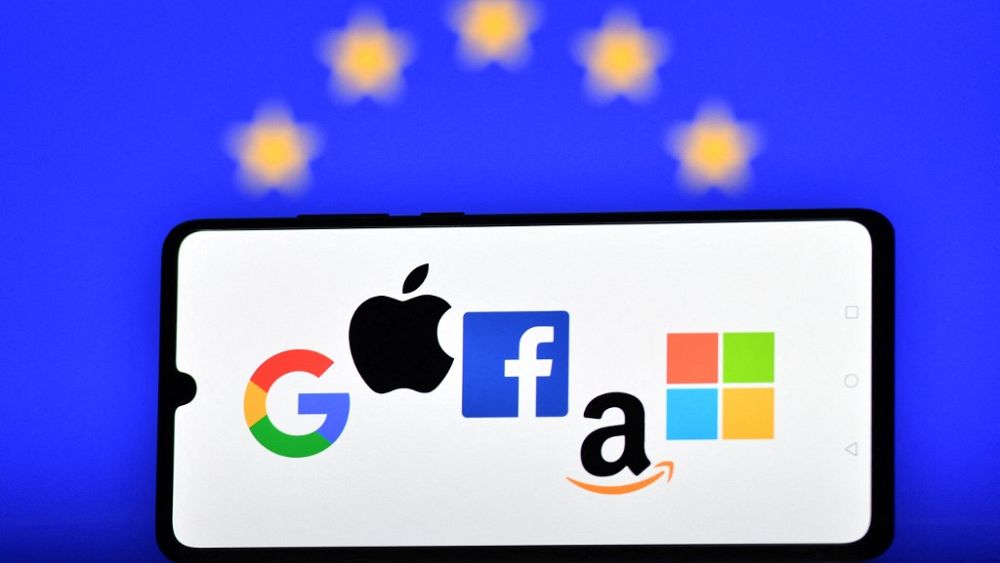
The EU is another step closer to finalising the so-called Digital Services Act that, once approved, will be a milestone in how internet giants are regulated and provide tightened security for users.
On Thursday, the European Parliament overwhelmingly approved its position for negotiations with member states and the European Commission, as they seek to hammer out the fine details before it eventually becomes law.
Big Tech companies have campaigned long and hard to water down the proposal, but what exactly is it and how will it work?
What are digital services?
Digital services play an important role in our life: we use websites, social media, e-books, cloud-based storage, music, and video streaming. All of these are defined as digital services.
What is the Digital Services Act?
In December 2020, the European Commission proposed a new legislative framework to tackle challenges like the sale of fake products, spreading of hate speech, cyber threats, limiting of competition and market dominance.
The basic idea behind the proposal is: what is illegal in the real world, should be illegal in the online world as well. Once adopted, it aims to create a safer online world. It will essentially modernise the e-commerce directive of the EU.
What will the Digital Sevices Act do?
The DSA will enable users to have a say on what they see online. It is meant to regulate targeted adverts, for example, and it will oblige platforms to erase harmful and illegal content. In particular, it will target online hate speech, disinformation, and counterfeit products. Platforms will face sanctions if they fail to act.
Which providers will be impacted by the Digital Services Act?
The new law will affect platforms and online intermediaries used by hundreds of millions of Europeans every day. They include social media platforms like Twitter and Facebook, app stores, video and music sharing platforms like YouTube and Spotify, online travel sites like Airbnb, and other digital marketplaces.
Special attention will be paid to large online platforms (with more than 45 million active users per month). The act will also apply to companies based outside of the EU if they provide services in the single market.
How will businesses be affected?
Legislators expect that the law will provide a level playing field in the market and will enable small and medium enterprises to enter the market. They also say that third countries will follow the EU’s example in setting digital services’ standards.
What will the impact be on me?
Users will be able to flag illegal content, with the platform then obliged to notify them of any decisions. There will be also a system of trusted flaggers established for entities with special expertise in a particular area.
There will be specific rules for large online platforms, where users will be able to avoid personalised content. Platforms will be more accountable for disinformation. It will also allow users to get in touch with social media companies in case their accounts are blocked, for example.
And the next steps?
With the European Parliament’s negotiating position on the act established, talks will now begin with both the European Council and Commission.
France, which currently holds the rotating presidency of the EU Council, wants to wrap up the file before its term ends in July, but many experts say this is highly unlikely. Once talks are concluded though, MEPs will have to vote on the final deal, after which — and if approved — the legislation will then have to be applied in member states before becoming law.
THE ROTTEN FISH: CAN OF WORMS OPENED OF APC & TINUBU'S GOVERNMENT OVER NIGERIA'S ECONOMIC DOWNTURN
WATCH THE CRITICAL ANALYSIS AND KNOW THE RESPONSIBLE PARTIES TO BLAME FOR NIGERIA'S ECONOMIC CHALLENGES, WHILE CITIZENS ENDURE SEVERE HARDSHIPS.Watch this episode of ISSUES IN THE NEWS on 9News Nigeria featuring Peter Obi's Special Adviser, Dr Katch Ononuju, 9News Nigeria Publisher, Obinna Ejianya and Tinubu Support Group Leader, McHezekiah Eherechi
The economic crisis and hardship in Nigeria are parts of the discussion.
Watch, leave your comments, and share to create more awareness on this issue.
#9NewsNigeria #Nigeria #issuesInTheNews #politics #tinubu THE ROTTEN FISH: CAN OF WORMS OPENED ...
DON'T FORGET TO SUBSCRIBE AND LEAVE YOUR COMMENTS FOR SUBSEQUENT UPDATES
#9newsnigeria #economia #economy #nigeria #government @9newsng
www.9newsng.com
